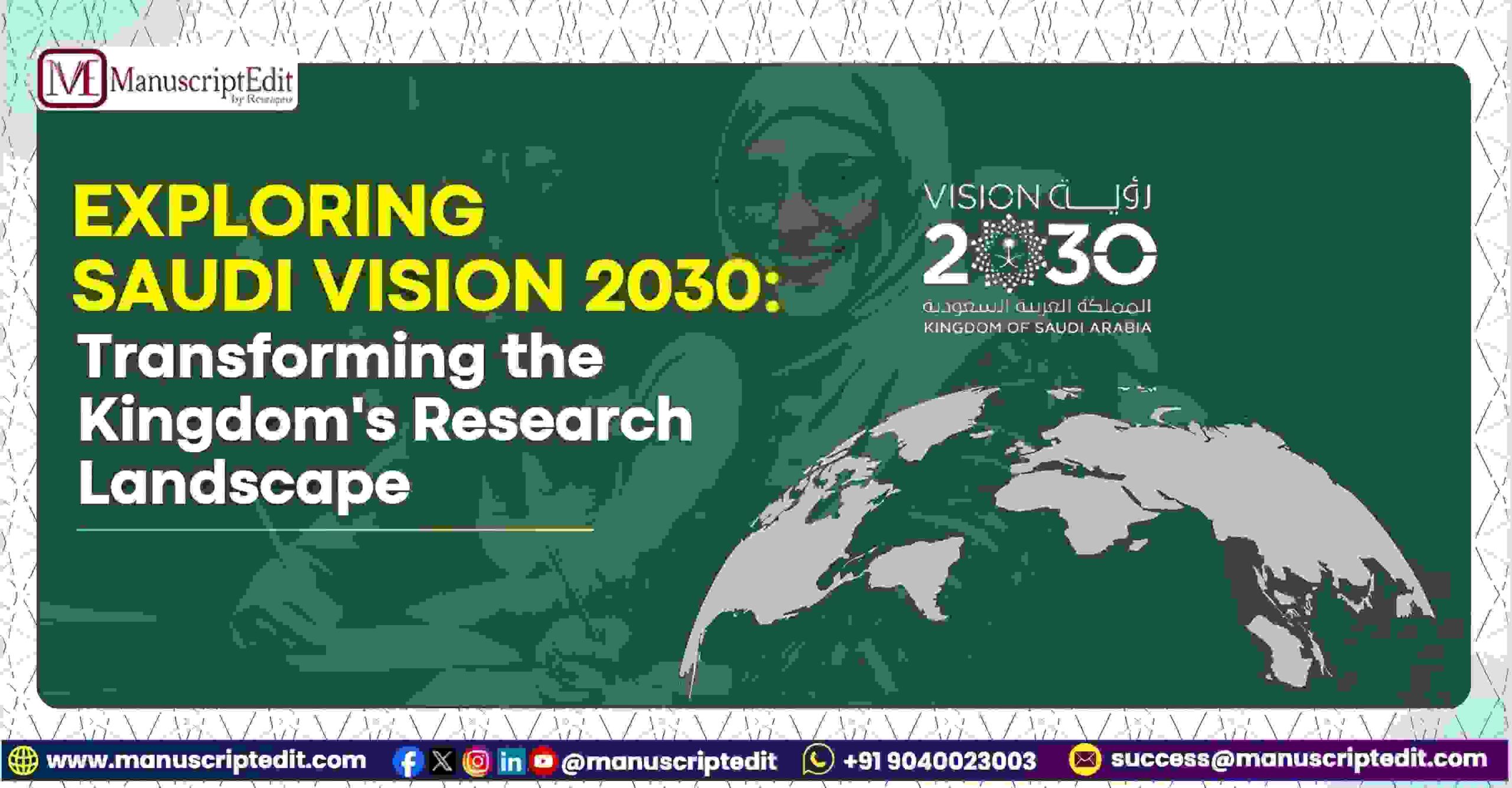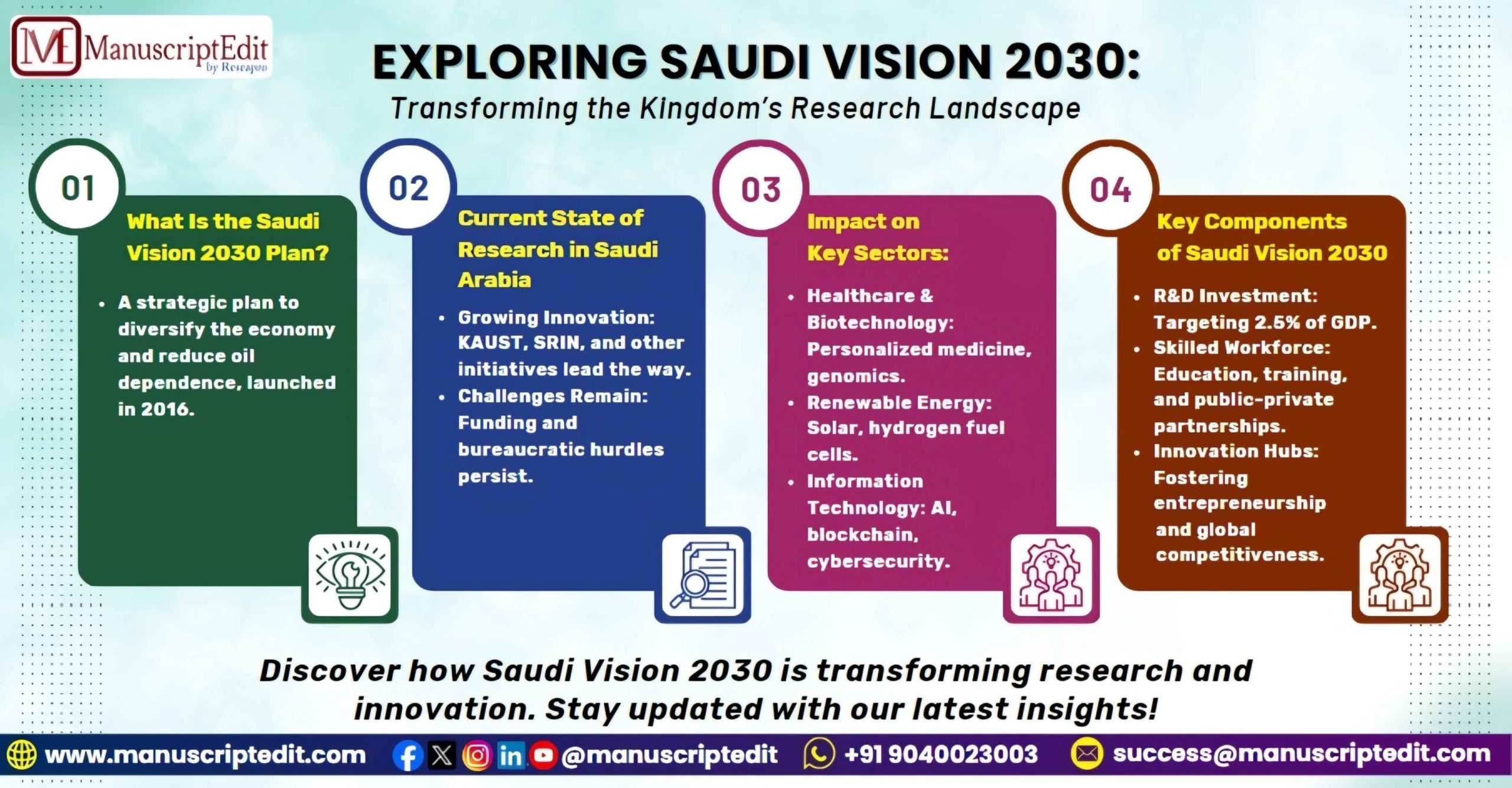 Saudi Arabia, a nation historically known for its vast oil reserves and religious significance, is now embarking on an ambitious journey to transform its economy and society through Saudi Vision 2030. This strategic plan, launched in 2016, seeks to reduce the kingdom’s dependency on oil, diversify its economy, and develop various public sectors, including education, healthcare, and tourism. A key element of Saudi Vision 2030 is its emphasis on research and innovation, which is seen as a critical driver of sustainable growth and a knowledge-based economy. In this blog post, we will delve into the intricacies of Saudi Vision 2030, exploring how it is reshaping the kingdom’s research landscape and positioning Saudi Arabia as a global leader in innovation and technology.
Saudi Arabia, a nation historically known for its vast oil reserves and religious significance, is now embarking on an ambitious journey to transform its economy and society through Saudi Vision 2030. This strategic plan, launched in 2016, seeks to reduce the kingdom’s dependency on oil, diversify its economy, and develop various public sectors, including education, healthcare, and tourism. A key element of Saudi Vision 2030 is its emphasis on research and innovation, which is seen as a critical driver of sustainable growth and a knowledge-based economy. In this blog post, we will delve into the intricacies of Saudi Vision 2030, exploring how it is reshaping the kingdom’s research landscape and positioning Saudi Arabia as a global leader in innovation and technology.
What Is the Saudi Vision 2030 Plan?
Saudi Vision 2030 is a comprehensive roadmap designed to propel Saudi Arabia into a future defined by economic diversification, technological advancement, and social progress. The plan was initiated by Crown Prince Mohammed bin Salman as part of the kingdom’s efforts to move away from its reliance on oil revenues, which have historically been the backbone of its economy. Instead, Vision 2030 aims to foster new industries, attract foreign investment, and improve the overall quality of life for Saudi citizens. At the core of Saudi Vision 2030 is the transformation of the kingdom’s economic structure. This includes increasing non-oil exports, enhancing public sector efficiency, and fostering a more dynamic private sector. The plan also emphasizes the importance of human capital development, focusing on education, training, and workforce development to create a skilled labor force capable of driving innovation and economic growth. The ultimate goal of Saudi Vision 2030 is to position Saudi Arabia as a modern, sustainable, and globally competitive economy. By diversifying its economic base, the kingdom aims to achieve long-term stability and prosperity, reducing its vulnerability to fluctuations in oil prices and ensuring a better future for its people.
The Current State of Research in Saudi Arabia
Saudi Arabia’s research landscape has undergone significant changes in recent years, driven by the kingdom’s commitment to innovation and knowledge creation. The establishment of institutions such as the King Abdullah University of Science and Technology (KAUST) and the Saudi Research and Innovation Network (SRIN) has played a pivotal role in advancing research and development (R&D) in the country. KAUST, in particular, has emerged as a leading research university, attracting top talent from around the world and contributing to groundbreaking research in fields such as renewable energy, biotechnology, and artificial intelligence. The university’s state-of-the-art facilities and collaborative environment have made it a hub for scientific discovery and innovation.
However, despite these advancements, Saudi Arabia’s research ecosystem still faces several challenges. One of the most significant hurdles is limited funding for research initiatives. While Vision 2030 aims to increase R&D investment to 2.5% of GDP, the current level of funding remains relatively low compared to other leading nations. This has led to a brain drain, with talented researchers leaving the country in search of better opportunities abroad. Bureaucratic obstacles also pose challenges to research innovation in Saudi Arabia. Administrative inefficiencies and complex regulations can hinder the progress of research projects, delaying the implementation of new ideas and technologies. Addressing these issues is crucial for the kingdom to realize its full potential as a knowledge-based economy.
Key Components of Saudi Vision 2030 Related to Research
Saudi Vision 2030 outlines several key components related to research and innovation that are designed to transform the kingdom’s economy and position it as a global leader in technology and knowledge creation. These components include:
- Increased R&D Investment: Vision 2030 aims to increase research and development (R&D) spending to 2.5% of GDP. This ambitious target underscores the kingdom’s commitment to fostering innovation and supporting research initiatives that drive economic diversification.
- Establishment of Research Centers: The plan calls for the creation of specialized research centers and institutes across various sectors, including healthcare, renewable energy, information technology, and biotechnology. These centers are expected to become hubs of innovation, attracting top researchers and fostering collaboration with global institutions.
- Skilled Workforce Development: Education and training are key pillars of Vision 2030, with a focus on developing a skilled workforce capable of driving research and innovation. The plan emphasizes the importance of STEM (Science, Technology, Engineering, and Mathematics) education, as well as vocational training, to equip Saudi citizens with the knowledge and skills needed for a knowledge-based economy.
- Promotion of Entrepreneurship: Vision 2030 seeks to create a vibrant entrepreneurial ecosystem by supporting startups and small and medium-sized enterprises (SMEs). The plan encourages public-private partnerships and provides funding and resources to help entrepreneurs turn innovative ideas into successful businesses.
- Global Standards Alignment: Saudi Arabia aims to align its research and innovation efforts with global standards, ensuring that the kingdom remains competitive in the international arena. This includes adopting best practices in research governance, ethics, and intellectual property rights, as well as fostering international collaborations.
Transforming the Research Landscape
The implementation of Saudi Vision 2030 is already beginning to transform the kingdom’s research landscape. The establishment of new research centers and the enhancement of existing institutions are creating a more robust and dynamic research ecosystem. These initiatives are fostering a culture of innovation and entrepreneurship, encouraging researchers to explore new ideas and push the boundaries of scientific discovery.
International collaborations are also playing a crucial role in this transformation. By partnering with leading global institutions, Saudi Arabia is gaining access to cutting-edge technologies, expertise, and resources that are helping to accelerate its research and innovation efforts. These partnerships are also facilitating knowledge transfer, enabling Saudi researchers to learn from their international counterparts and apply their insights to local challenges.
Furthermore, the Saudi government’s commitment to research funding is helping to address some of the challenges that have historically hindered the kingdom’s research ecosystem. Initiatives such as the Saudi Research and Innovation Network and research grants are providing much-needed financial support to researchers, allowing them to pursue ambitious projects and contribute to the country’s knowledge economy.
Impact on Various Sectors
The research initiatives under Saudi Vision 2030 are expected to have a profound impact on several key sectors of the economy, driving innovation and improving the quality of life for Saudi citizens. Some of the sectors that are likely to benefit the most include:
- Healthcare and Biotechnology: Vision 2030 aims to position Saudi Arabia as a leader in healthcare innovation, with a focus on personalized medicine, genomics, and biotechnology. Research in these areas is expected to lead to the development of new treatments and therapies, improving patient outcomes and reducing healthcare costs.
- Renewable Energy and Sustainability: Saudi Arabia is investing heavily in renewable energy research, particularly in solar and hydrogen fuel cells. These efforts are aimed at reducing the kingdom’s carbon footprint and ensuring a sustainable energy future. By becoming a leader in renewable energy, Saudi Arabia can also diversify its economy and reduce its reliance on oil.
- Information Technology and Cybersecurity: The kingdom is also focusing on advancing research in information technology and cybersecurity. By leveraging emerging technologies such as artificial intelligence, blockchain, and data analytics, Saudi Arabia aims to enhance its digital infrastructure, protect its critical assets, and drive innovation in various industries.
 Challenges and Opportunities
Challenges and Opportunities
While Saudi Vision 2030 presents numerous opportunities for transforming the kingdom’s research landscape, several challenges remain. One of the primary challenges is ensuring adequate funding for research initiatives. Although the plan calls for increased R&D investment, securing sufficient resources to support ambitious projects and attract top talent will be crucial to the success of Vision 2030.
Another challenge is building research capacity. Developing a skilled workforce and fostering a culture of innovation will require significant investment in education and training programs. Ensuring that these programs are accessible to all segments of society, including women and marginalized groups, will be essential for achieving inclusive growth.
Despite these challenges, the opportunities presented by Saudi Vision 2030 are immense. The plan’s emphasis on international collaborations, public-private partnerships, and entrepreneurship provides a solid foundation for creating a vibrant research ecosystem. By leveraging these opportunities, Saudi Arabia can position itself as a global leader in research and innovation, driving economic growth and improving the quality of life for its citizens.
Saudi Vision 2030 is a bold and ambitious plan that has the potential to transform the kingdom’s research landscape and drive innovation across various sectors. By increasing R&D investment, establishing research centers, and fostering international collaborations, Saudi Arabia is laying the groundwork for a knowledge-based economy. While challenges remain, the kingdom’s commitment to research and innovation bodes well for its future. With the right support and resources, Saudi Arabia is poised to make significant strides in scientific discovery, technological advancement, and economic diversification, ultimately achieving the goals of Vision 2030 and securing a prosperous future for its people.
Conclusion
In conclusion, Saudi Vision 2030 has transformed the research landscape, driving innovation and growth. With increased funding, international collaborations, and a focus on emerging technologies, Saudi Arabia is poised for a knowledge-based economy.
The future outlook is promising, with potential for groundbreaking discoveries, entrepreneurial spirit, and a thriving research ecosystem.
References
- https://www.editage.com/blog/saudi-vision-2030-and-the-kingdoms-research-landscape/
- https://www.linkedin.com/posts/trackingksa_saudi-vision-2030-and-the-kingdoms-research-activity-7184414955612368896-PC4r



